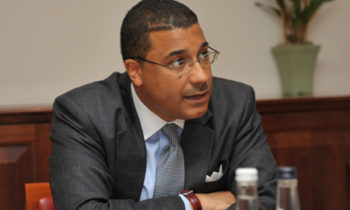 On 6 September, US Assistant Secretary of State Frank Rose and Senior Researcher Sverre Lodgaard (NUPI) discussed nuclear policy.
On 6 September, US Assistant Secretary of State Frank Rose and Senior Researcher Sverre Lodgaard (NUPI) discussed nuclear policy.
In a lively and thought provoking breakfast seminar at the Norwegian Institute for Defence Studies (IFS), United States Assistant Secretary of State Frank Rose and Senior Researcher Sverre Lodgaard of the Norwegian Institute for International Affairs (NUPI) discussed issues ranging from nuclear disarmament, ballistic missile defense, treaty obligations and US nuclear declaratory policy. IFS Director Sven Holtsmark offered a few introductory remarks and the seminar was chaired by IFS Research Fellow Kristin Ven Bruusgaard.
The seasoned US diplomat prefaced his remarks by alluding to a series of news reports that he believed inaccurately portrayed the positions of the Obama administrations nuclear weapons policies. Rose spoke out strongly against one proposal currently being debated – a treaty to completely ban nuclear weapons – and instead suggested that the US was willing to further reduce its arsenal by one third but lacked constructive and willing partners. He argued that the United States has made good progress on disarmament after the president’s 2009 Prague speech calling for a nuclear weapons free world.
US DISARMAMENT AND NUCLEAR WEAPONS MODERNIZATION
Rose listed the administration’s disarmament accomplishments, including the 2010 Nuclear Posture Review which included a so-called “Negative Security Assurance” in US declaratory policy (for non-nuclear weapons states in compliance with the Non-proliferation Treaty (NPT)), the signing of the New START Treaty with Russia reducing and limiting numbers of nuclear delivery systems and (crucially) continuing the transparency-enhancing verification regime, the series of four nuclear security summits, and the signing of an agreement with the government of Iran ending its nuclear weapons program.
Rose maintained that warhead modernization programs in the United States are necessary to maintain the reliability and safety of these ageing weapons systems, and pointed out that by retaining a reliable nuclear triad and reducing the incentive for an adversary to threaten a first strike, the US is promoting strategic stability. He pointed out that both Russia and China have been pursuing modernization programs for a number of years.
He noted that Russia remains in (serious) violation of the treaty on Intermediate Nuclear Forces (INF) in Europe [ed: due to its development of a new land-based cruise missile], but emphasized that it was most important to remain focused on the continued implementation of New START. Rose dismissed the treaty for a complete ban on nuclear weapons as an unrealistic “pie in the sky” proposal that does not take the current security environment into account, would not bind existing nuclear weapons states, has no viable verification regime and may harm disarmament efforts within the NPT framework.
LODGAARD’S COMMENTS ON US POLICY
Senior Researcher Sverre Lodgaard, in his response, first touched on broad geopolitical trends by observing that the American empire would naturally be most focused on the second most powerful state in the system striving to overtake the hegemon, namely China. He suggested that US–China arms control talks might be necessary in the near future. Lodgaard agreed with much of Rose’s talk, and was complimentary of the administration’s disarmament efforts within its first 18 months. The 2010 NPR was a breakthrough with its Negative Security Assurance, even though he saw no reason not to expand this assurance to a full “no first use” policy.
Lodgaard challenged other elements of US policy as well. He contrasted Iran’s compliance to the new “Joint Comprehensive Plan of Action” with the continued lack of movement in the United States on sanctions relief, but placed the blame primarily on the complexity of the sanctions and the inaction of the US Congress. Additionally, the Iran deal also further weakened the already questionable justification for US and NATO missile defense system in Europe. Lodgaard argued that Russia and China might be justified in their concerns over American missile defense deployments and the threat to their strategic deterrent capabilities He questioned the wisdom of developing a conventional prompt global strike capability that could be confused with nuclear delivery systems and therefore be inherently destabilizing. Lodgaard concluded by suggesting a new conference to begin outlining how a nuclear free world might look.
Q&A: BMD, NUCLEAR WEAPONS BAN AND NATO POLICY
Several lively queries from the audience challenged Assistant Secretary Rose. One participant wondered about a new strategic dialogue with Russia about BMD, which Rose responded to by reiterating that the US is ready to discuss strategic issues with Russia, but that the most important issue at hand now to keep New START on track. Rose noted once again that the US was willing to reduce its nuclear stockpiles by an additional one-third, but this required a productive partner – which Russia currently was not.
A participant inquired about the nuclear weapons ban treaty that had been discussed in the Norwegian parliament, and whether support for such a ban was consistent with Norway’s NATO membership. Rose declined to comment on domestic Norwegian politics but pointed out that NATOs defense policy continues to include a nuclear deterrent capability and is therefore incompatible with a complete ban. Furthermore, he pointed out that a verification regime for delivery systems such as that included in New START was difficult, and verifying individual warheads (which would be necessary for such a ban) would be even more challenging.
CONCLUDING REMARKS
Encouraged by Ven Bruusgaard to reflect over potential lessons of Cold War disarmament for managing adversarial relations between great powers, Lodgaard noted that importance of institutions and confidence building measures for improving both arms control regimes and strategic relationships. Rose observed that while arms control and defense policy were closely linked during the Cold War, this connection has been lost in the post-Cold War era. Rose concluded by noting that disarmament and arms control were not goals themselves, but means to produce stable and predictable relationships that improve international security.
(forsvaret, Summary by Michael Mayer)
